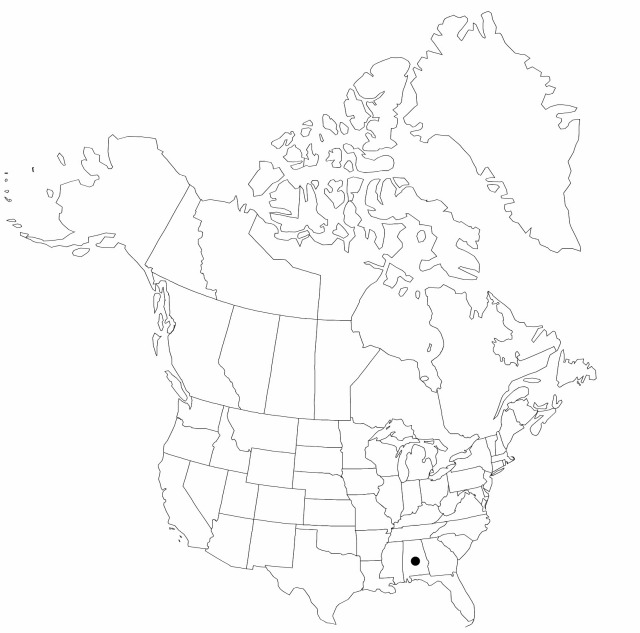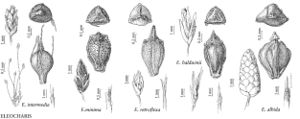Difference between revisions of "Eleocharis retroflexa"
Symb. Antill. 2: 165. 1900.
FNA>Volume Importer |
FNA>Volume Importer |
||
| Line 14: | Line 14: | ||
|name=Baeothryon retroflexum | |name=Baeothryon retroflexum | ||
|authority=A. Dietrich | |authority=A. Dietrich | ||
| − | }}{{Treatment/ID/Synonym | + | }} {{Treatment/ID/Synonym |
|name=Chaetocyperus niveus | |name=Chaetocyperus niveus | ||
|authority=Liebmann | |authority=Liebmann | ||
| − | }}{{Treatment/ID/Synonym | + | }} {{Treatment/ID/Synonym |
|name=Chaetocyperus polymorphus var. depauperatus | |name=Chaetocyperus polymorphus var. depauperatus | ||
|authority=Nees | |authority=Nees | ||
| − | }}{{Treatment/ID/Synonym | + | }} {{Treatment/ID/Synonym |
|name=Chaetocyperus rugulosus | |name=Chaetocyperus rugulosus | ||
|authority=Nees | |authority=Nees | ||
| − | }}{{Treatment/ID/Synonym | + | }} {{Treatment/ID/Synonym |
|name=Chaetocyperus viviparus | |name=Chaetocyperus viviparus | ||
|authority=Liebmann | |authority=Liebmann | ||
| − | }}{{Treatment/ID/Synonym | + | }} {{Treatment/ID/Synonym |
|name=Cyperus depauperatus | |name=Cyperus depauperatus | ||
|authority=Vahl | |authority=Vahl | ||
| − | }}{{Treatment/ID/Synonym | + | }} {{Treatment/ID/Synonym |
|name=Eleocharis depauperata | |name=Eleocharis depauperata | ||
|authority=Kunth | |authority=Kunth | ||
| Line 47: | Line 47: | ||
|elevation=0–10 m | |elevation=0–10 m | ||
|distribution=Ala.;Mexico;West Indies;Bermuda;Central America;South America;Asia (including Indonesia);Pacific Islands;Australia. | |distribution=Ala.;Mexico;West Indies;Bermuda;Central America;South America;Asia (including Indonesia);Pacific Islands;Australia. | ||
| − | |discussion=<p>We have seen only one collection of Eleocharis retroflexa from the flora area (Mobile, Alabama, in 1896, US). Other populations are likely in the United States Gulf States. The broad-shouldered, strongly sculptured achenes, trilobed, decurrent tubercles, and basal spikelets are distinctive.</p> | + | |discussion=<p>We have seen only one collection of <i>Eleocharis retroflexa</i> from the flora area (Mobile, Alabama, in 1896, US). Other populations are likely in the United States Gulf States. The broad-shouldered, strongly sculptured achenes, trilobed, decurrent tubercles, and basal spikelets are distinctive.</p> |
|tables= | |tables= | ||
|references= | |references= | ||
| Line 71: | Line 71: | ||
|publication year=1900 | |publication year=1900 | ||
|special status= | |special status= | ||
| − | |source xml=https://jpend@bitbucket.org/aafc-mbb/fna-data-curation.git/src/ | + | |source xml=https://jpend@bitbucket.org/aafc-mbb/fna-data-curation.git/src/8f726806613d60c220dc4493de13607dd3150896/coarse_grained_fna_xml/V23/V23_142.xml |
|genus=Eleocharis | |genus=Eleocharis | ||
|subgenus=Eleocharis subg. Eleocharis | |subgenus=Eleocharis subg. Eleocharis | ||
Revision as of 17:05, 18 September 2019
Plants annual, tufted, mat-forming, often stoloniferous, sometimes entirely vegetative; rhizomes absent. Culms erect, ascending or arching, pentagonal, sulcate, 1.5–10 cm × 0.2–0.3 mm [larger], soft. Leaves: distal leaf sheaths persistent or disintegrating, pale brown to green, red-spotted [mostly red-brown], membranous; apex acuminate. Spikelets: basal spikelets usually present, bisexual; often proliferous, ellipsoid or obovoid, laterally compressed, 1.7–3.9 × 1.2–2 mm, apex acute; proximal scale empty or with a flower, deciduous, amplexicaulous, similar to floral scales (sometimes 2.4–2.9 mm); subproximal scale with a flower; floral scales clearly distichous, 2–6 [or more], 4–6 per mm of rachilla, pale brown [marked red-brown], ovate or elliptic, 1.8–2.5 × 0.8–1.4 mm, membranous, apex rounded to obtuse, midribs green, keeled. Flowers: perianth bristles 6, colorless or pale brown, shorter than achenes; spinules not evident at 45X; stamens 3; anthers (0.55–)0.7 mm; styles 3-fid. Achenes stramineous (to cream), obovoid, trigonous or subterete, not compressed, angles prominent, 0.8 × 0.5–0.55 mm, apex not constricted proximal to tubercle, coarsely cancellate or honeycomb-reticulate at 10–15X. Tubercles red-brown, pyramidal, trigonous, proximally clearly to obscurely 3-lobed, lobes decurrent on achene angles, 0.3–0.35 × 0.3–0.4 mm.
Phenology: Fruiting summer.
Habitat: Freshwater ponds, stream banks, marshes, sandy or muddy soils
Elevation: 0–10 m
Distribution

Ala., Mexico, West Indies, Bermuda, Central America, South America, Asia (including Indonesia), Pacific Islands, Australia.
Discussion
We have seen only one collection of Eleocharis retroflexa from the flora area (Mobile, Alabama, in 1896, US). Other populations are likely in the United States Gulf States. The broad-shouldered, strongly sculptured achenes, trilobed, decurrent tubercles, and basal spikelets are distinctive.
Selected References
None.
